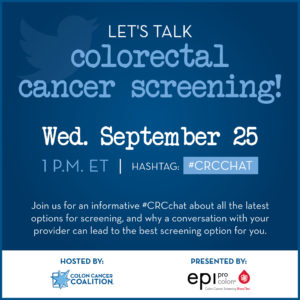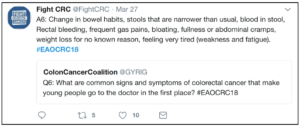What is a Twitter Chat?

Thank you to Epi proColon for supporting this Twitter Chat, and for the work they do to help get more people screened for colorectal cancer.
A Twitter Chat is a running conversation on Twitter during a set time that revolves around a predetermined topic. The Twitter Chat can be found, followed, and contributed to by using a designated hashtag. For this Twitter Chat on colorectal cancer screening it will be #CRCchat.
Why participate in a Twitter Chat?
Participating in a Twitter Chat lets you be part of an important conversation, and allows you to pull up a seat at the table next to survivors, providers, organizations, and institutions working to prevent colorectal cancer through screening. It is your chance to have your voice heard, and to make your experience and work matter. It is also a great way to connect with others in the shared space who have a vested interested in the cause.
How to participate in a Twitter Chat?
For one hour, anyone interested is welcome to be part of the discussion topic of the Twitter Chat. This time we’ll be talking about the screening options available aside from a colonoscopy! Every Twitter Chat has a topic, and the questions asked will revolve around at-home and blood-based screening tests. It’s easy to join by following the hashtag #CRCchat.
 There are a set number of questions that will be presented in scheduled increments. Each question will be preceded with “Q1” through “Q7,” and participants can retweet with an answer appropriately labeled “A1” through “A7.” The Colon Cancer Coalition will be asking the questions from their Twitter account (@gyrig) and everyone should retweet any question they want to answer with their response so their answer makes sense.
There are a set number of questions that will be presented in scheduled increments. Each question will be preceded with “Q1” through “Q7,” and participants can retweet with an answer appropriately labeled “A1” through “A7.” The Colon Cancer Coalition will be asking the questions from their Twitter account (@gyrig) and everyone should retweet any question they want to answer with their response so their answer makes sense.
Feel free to attach any resources, links, or photos in your response that you think will help! Responding to the questions live during the Twitter Chat is not a requirement for participation. We hope others will join in the hours and days after the chat as the responses reverberate throughout Twitter.
Twitter Chat Questions:
Q1: The colorectal cancer community can agree that “the best test is the one that gets done,” yet many people aren’t aware they have multiple options for being screened. How can we reach and educate more people about screening options? #CRCchat
Q2: Why can knowing screening options help increase a person’s likelihood of being screened? #CRCchat
Q3: When is an ideal time for a patient and provider to begin discussing colorectal cancer screening? #CRCchat
Q4: Though a colonoscopy is the only way to prevent colorectal cancer, stool-based DNA tests, FIT/FOBT, or blood-based tests are still great options for detecting cancer. What are some things patients should know if they opt to take one of these other tests. #CRCchat
Q5: The latest FDA-approved screening test for colorectal cancer is a blood test. Why are options like a blood test important to add to the list of screening tools? #CRCchat
Q6: Each screening test has a different timeline for patients with normal results to screen again, yet many don’t know how often they need to repeat the test. How can we better communicate when to screen again, and how important it is to stay up-to-date on testing. #CRCchat
Q7: And finally, in colorectal cancer advocacy, we talk about the importance of knowing your family health history. Why can this be important information to have before considering the best screening test for you? #CRCchat


Michigan Society of Gastroenterology Nurses and Associates commend your efforts. Our members are advocates for colonoscopy.
We held a Twitter Chat in June of this year devoted just to colonoscopies, and plan to do the same in 2020. If MSGNA or any of its member are on Twitter, we’d love to have you join the conversation next year. We work to dispel many of the myths surrounding colonoscopies, and had a gastroenterologist guest host the chat to answer many frequently asked questions. -Sarah DeBord